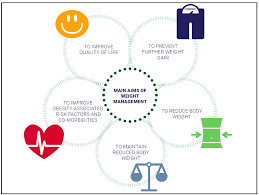The Role Of Diet In Managing And Preventing Obesity.


Obesity, a global health concern, is characterized by excessive body fat accumulation. It poses significant risks to both physical and mental well-being. One of the key factors contributing to obesity is diet. In this article, we will delve into the relationship between diet and obesity, exploring ways to manage and prevent this condition through mindful eating.


Understanding Obesity:
Obesity occurs when the energy intake from food exceeds the energy expenditure through physical activity and metabolic processes. It is influenced by genetic, environmental, and behavioral factors. However, diet plays a central role in the development and management of obesity.
The Impact of Diet:
Unhealthy eating habits, including the consumption of high-calorie, low-nutrient foods, contribute to weight gain and obesity. Diets high in processed foods, sugary beverages, and saturated fats can lead to overconsumption of calories while providing minimal nutritional value.
Healthy Diet Strategies:
Adopting a balanced and nutritious diet is essential for managing and preventing obesity. Here are some effective strategies:
Embrace Whole Foods: Prioritize whole, unprocessed foods such as fruits, vegetables, whole grains, lean proteins, and healthy fats. These foods are nutrient-dense and provide essential vitamins, minerals, and fiber.
Portion Control: Be mindful of portion sizes to avoid overeating. Utilize smaller plates, bowls, and utensils to help regulate portion sizes visually.
Limit Sugary and Processed Foods: Minimize the consumption of sugary snacks, sugary drinks, and highly processed foods. These items are often calorie-dense and lack nutritional value.
Choose Lean Proteins: Opt for lean sources of protein, such as poultry, fish, beans, and legumes. Protein helps increase satiety and supports muscle maintenance.
Incorporate Fiber: Fiber-rich foods like whole grains, fruits, and vegetables provide a feeling of fullness and aid digestion.
Stay Hydrated: Drink water throughout the day to stay hydrated and reduce the likelihood of confusing thirst with hunger.
Preventing Childhood Obesity:
Promoting a healthy diet in children is vital to preventing obesity. Encourage the consumption of nutrient-rich foods and limit access to sugary snacks and drinks. Role-modeling healthy eating habits can positively influence children's dietary choices.
Mindful Eating:
Practicing mindful eating involves paying attention to hunger and fullness cues, savoring the taste of food, and eating without distractions. This approach can prevent overeating and encourage a healthier relationship with food.
Seeking Professional Guidance:
Individuals struggling with obesity should consider seeking guidance from healthcare professionals, registered dietitians, or nutritionists. They can provide personalized recommendations and support tailored to individual needs and goals.
Conclusion:
Diet plays a pivotal role in the development and management of obesity. By making informed choices, embracing a balanced diet rich in whole foods, and practicing mindful eating, individuals can take control of their health and well-being. Preventing and managing obesity requires a holistic approach that combines healthy eating, regular physical activity, and professional guidance. Remember, every small step toward a healthier diet contributes to a healthier life and a reduced risk of obesity-related complications.

